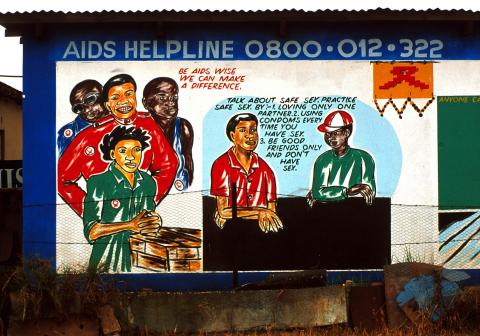This report documents household characteristics, solid waste management (SWM) and the associated risks to health in two cities in Kenya. The study was conducted in the communities of Korogocho/Dandora, Saika and Makadara in Nairobi, and Bamburi and Kisauni in Mombasa. The selection of the communities was informed by the need to examine the commonalities and differences as well as the magnitude of perceived risks vis-a-vis SWM practices in the respective locations. […]
Read More…
Timely provision of accurate and comprehensive information and life skills training regarding sexual and reproductive health and rights is essential for adolescents to achieve sexual health and rights and avoid negative health outcomes. […]
Read More…
By 2025, West and Central Africa (WCA) will not only have the largest number of young people globally but will also be the only region of the world where the population of young people will continue to grow. Protecting the lives and ensuring the well-being of these young people is a precondition for development and progress in the sub-region.
This fact sheet presents evidence on the situation of young people in WCA. It specifically addresses the health, economic, educational, demographic, and other conditions related to young people in the sub-region, and highlights essential evidence in the drive towards the region’s first demographic dividend and much-vaunted vision of shared prosperity for all its citizens. […]
Read More…
The Routledge Handbook of Community Development explores community development theory and practice across the world. The book provides perspectives about community development as an interactive, relevant and sometimes contradictory way to address issues impacting the human condition. It promotes better understanding of the complexities and challenges in identifying, designing, implementing and evaluating community development constructs, applications and interventions.
This edited volume discusses how community development is conceptualized as an approach, method or profession. Themes provide the scope of the book, with projects, issues or perspectives presented in each of these areas. […]
Read More…
This fact sheet targeted at youth aged 15-19 years, highlights key components of comprehensive sexuality education and what it means for youth. It is based on the Assessing the Implementation of Sexuality Education Policies and Curricula report by APHRC and the Guttmacher Institute.
The study was conducted in three Kenyan sites: Nairobi, Homa Bay and Mombasa. This version is written in Luo for easy understanding among those who live in Homa Bay. […]
Read More…

Following on its special issue The Social Realities of Knowledge for Development, the Institute of Development Studies, the Impact Initiative, and Health […]
Read More…
Every child and parent in Kenya knows all too well that grades matter. During the final year of primary school, […]
Read More…
Education is supposed to equip young people with knowledge, skills and critical thinking abilities which will serve them throughout their lives within society. This view of education means that it should go beyond academic achievement and instead contribute to the development of well-rounded individuals who can actively participate in their communities.
Life skills help people to manage themselves throughout the course of their lives and make appropriate choices for an active, safe and productive life. They help the individual develop the flexibility to adjust to different life circumstances and strengthen their ability to develop solutions in the face of challenges. […]
Read More…
Melody Moraa is a 14-year-old girl from Kibra constituency, who has cerebral palsy: a condition that affects muscle tone, movement […]
Read More…
Boy meets girl. In our fast-paced world, they go through the motions and in an unlucky twist of fate, a […]
Read More…
A child’s brain develops rapidly during the first five years of life. In this time it is exposed to countless […]
Read More…
The free primary education policy has led to a significant increase in primary school enrollment in the country, from 8.6 million children in 2008 to 9.9 million in 2012. Increased enrollment complicated the work of teachers in the classrooms in the wake of FPE. This article seeks to document the challenges that teachers face in Kenyan classrooms across six urban sites in Kenya. Data come from the Education Research Program at the African Population and Health Research Center, collected in the months of January to March 2012.
This article presents data from Focus Group Discussions, which were analyzed using thematic qualitative analysis. Results show that teachers across the six urban sites faced numerous challenges, with the most striking one being the process of evaluation by district quality assurance officers, who need to take into consideration the circumstances in which teachers teach in the schools across the country. Overall, the study called for the need to take the contexts of the respective schools into consideration even as they visit schools to ensure that teachers adhere to the quality assurance and standards procedures. This is because different schools have different teachers implementing the curricula. […]
Read More…
Many adolescent girls in Kenya and elsewhere face considerable risks and vulnerabilities that affect their well-being and hinder a safe, healthy, and productive transition into early adulthood. Early adolescence provides a critical window of opportunity to intervene at a time when girls are experiencing many challenges, but before those challenges have resulted in deleterious outcomes that may be irreversible.
The Adolescent Girls Initiative-Kenya (AGI-K) is built on these insights and designed to address these risks for young adolescent girls. The long-term goal of AGI-K is to delay childbearing for adolescent girls by improving their well-being. […]
Read More…
The ages 10-14 years are among the most critical for human development, yet early adolescence is one of the most poorly understood stages of the life course. While the biological processes are universal, the social contexts within which they occur vary considerably. During this transition, young people are expected to assume socially defined gender roles that shape their sexual and reproductive health futures.
A cross-country longitudinal comparison offers a unique perspective on the commonalities and differences of the social processes shaping young people’s health and particularly the ways in which gender norms inform adolescent sexuality. The focus is on low-income adolescents primarily in urban settings—a vulnerable and fast-growing population worldwide.
Findings from this study will inform policy makers, program planners, parents, teachers, health and social service providers and adolescents themselves in the design of interventions that consider the unique strengths and challenges of this population. […]
Read More…
The study aimed to examine the schooling patterns of children living in rural settlements in Uganda as well as the quality of the education they receive. Specifically, the study sought to identify the key barriers that have the most effect on learning outcomes. The ultimate anticipation is that the evidence generated through this study will be used by policymakers to improve the provision of quality basic education for all children living in rural settings in Uganda. […]
Read More…
Preschool is a term used to describe early childhood education programs that serve children in their early ages (3-6 years), before they are of legal age to join primary school. Research evidence indicate that children gain a lot from preschool by gaining basic foundation skills required for learning, especially at the lower primary school level (see for example La Paro & Pianta, 2000; Sylva et al., 2004).
The objective of this policy brief is to examine the effects of preschool attendance on learning achievement of students attending primary schools in two rural districts of Iganga and Mayuge in Uganda. […]
Read More…
Increasing the number of children attending primary schools has topped the global development agenda since the turn of the century, with the commitments established by the Millennium Development Goals enhanced by the momentum of the Education For All initiative.
Many countries across sub-Saharan Africa have made laudable progress in boosting enrolment; in Uganda alone, the number of children in primary school increased by 28% between 2000 and 2010. This success, however, appears to have come at a cost; global consensus acknowledges that the quality of education has declined substantially during that period.
These declines have been widely attributed to the quality of teaching in these now highly subscribed schools. The challenge, therefore, is to understand how well teachers are going about the business of teaching – and what effect this will ultimately have not only on the quality of education but on the learning outcomes of the growing numbers of students. […]
Read More…
Globally, the high prevalence of overweight and low levels of physical activity among children has serious implications for morbidity and premature mortality in adulthood. Various parental factors are associated with childhood overweight and physical activity.
The objective of this paper was to investigate relationships between parental education or overweight, and (i) child overweight, (ii) child physical activity, and (iii) explore household coexistence of overweight, in a large international sample. […]
Read More…
The study aimed to examine the schooling patterns of children living in rural settlements in Uganda as well as the quality of the education they receive. Specifically, the study sought to identify the key barriers that have the most effect on learning outcomes. The ultimate anticipation is that the evidence generated through this study will be used by policymakers to improve the provision of quality basic education for all children living in rural settings in Uganda.
This is the longer, detailed version of the report. […]
Read More…
This report describes the baseline findings of an external evaluation of the Tayari pre-primary school programme. Tayari is an early childhood development and education (ECDE) intervention funded by the Children’s Investment Fund Foundation (CIFF). The intervention is implemented by the RTI International, in partnership with the Ministry of Education, Science and Technology (MoEST), and in collaboration with four counties.
The programme, which runs from January 2016 to October 2017, aims to develop a cost effective, scalable model of ECDE that ensures children who are preparing to join primary grade one are cognitively, physically, socially and emotionally ready to start, and succeed in primary school. The programme focuses on improving school readiness as defined by learners’ literacy, numeracy, psychosocial and executive function skills and targets preprimary schools in both public and Alternative Provision of Basic Education and Training (APBET) centres in four Kenyan counties: Laikipia, Nairobi, Siaya and Uasin Gishu. As the programme’s external evaluator, the role of the African Population and Health Research Center (APHRC) in Tayari is to assess the: (a) impact of the programme on preparing children for primary school; and, (b) cost-effectiveness of the programme. […]
Read More…

A Doctor of Philosophy, which most people know as a PhD, is the highest academic accolade. It demands a substantial […]
Read More…
For two days in February, I was privileged to lend a hand to 139 girls from Nairobi’s Viwandani and Korogocho slums. […]
Read More…

Join the Kenya Ministry of Education, Science and Technology (MoEST), African Population and Health Research Center (APHRC), Innovations for Poverty Action […]
Read More…